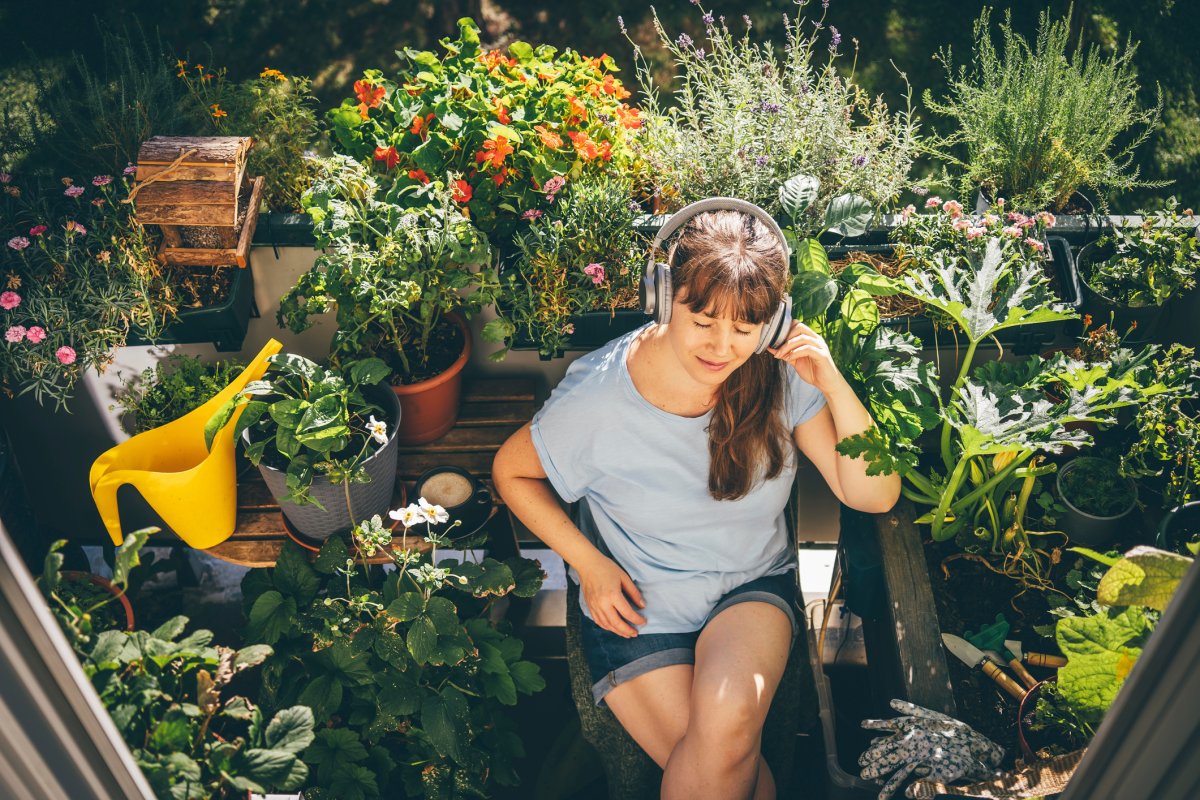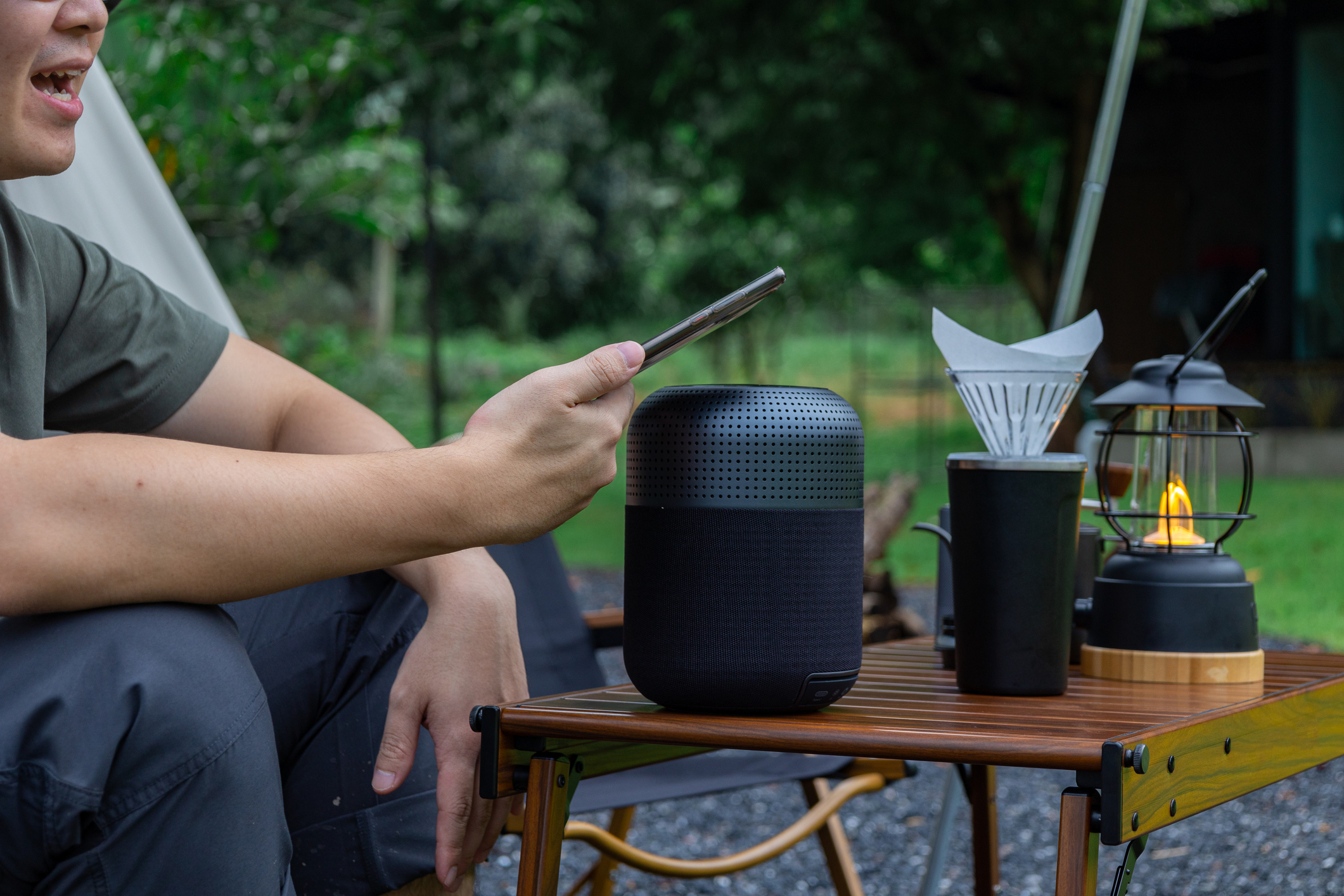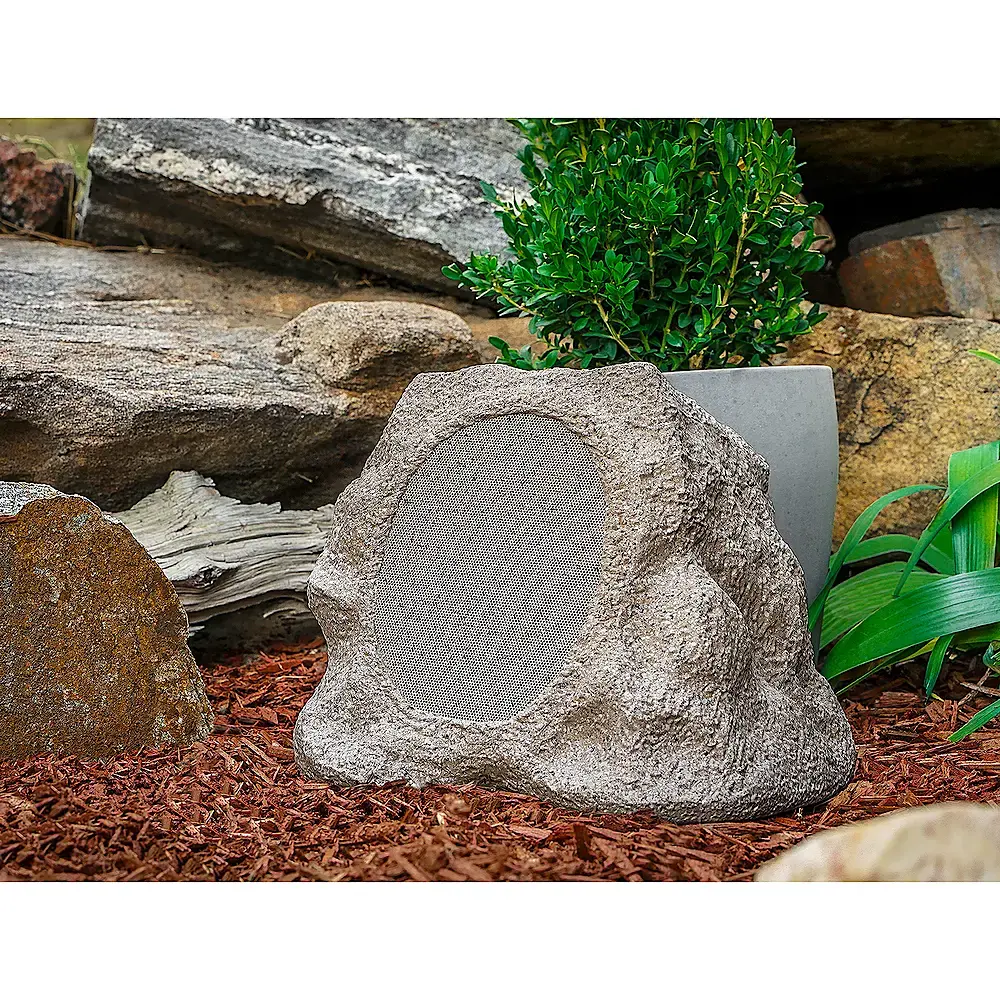

We may earn revenue from the products available on this page and participate in affiliate programs. Learn More ›
When we think of sounds in a garden, rustling leaves, trickling water, and cheerful wind chimes often come to mind. However, we can’t isolate ourselves from the common unwanted sounds that infiltrate our outdoor space. Whether you want to drown out irritating noise from traffic, aircraft, air conditioners, barking dogs, or construction, or simply want to whistle a happy tune while working in the garden, garden music can do the trick—and so much more.
According to the Garden Media Group’s 2025 Trends Report, “From concerts in public gardens to Spotify playlists for plants, music is a cherished addition to the experience. 81 percent of gardeners enjoy tunes while tending to their plants, with pop being the most popular genre. And we have all read the research that suggests plants themselves also ‘enjoy’ music.”
By playing music in your garden, you get to control more of what you hear and have the opportunity to create either a tranquil atmosphere or a fun, party one, depending on your song choices. Either way, music can help boost your mood while enjoying time in the garden, and there’s even some evidence that it helps the plants, too.
Discover the benefits of music for both gardeners and plants in the garden and the best technology options for playing music outdoors.
Why Music is Beneficial to Gardeners
Engaging in music, whether it be singing, listening, or creating it, provides biological and psychological benefits. Music helps us relax by providing a healthy distraction and keeping us focused on the moment at hand. As music draws our attention, it acts as a diversion from other distractions, like grating noises in our surroundings. It also prevents our mind from wandering to negative thoughts. In one study, participants exhibited significant reductions in heart rate, respiratory rate, and anxiety after listening to relaxing music for just 20 minutes. In another study, researchers found that music can be more effective than medicine in reducing anxiety.
“Listening to music while gardening can have positive effects on mood and mental wellbeing,” says John La Puma, MD, author, cofounder of ChefMD.com, and founder and farmer at LaPuma Farms in Santa Barbara, California. “It can lower stress and anxiety and increase motivation and enjoyment of gardening activities.” On his organic farm, he finds that music is as good for the gardeners as the plants.
“As a pest control expert, I know music in the garden can have benefits for both plants and people,” says Peter Rania, president and CEO of Waltham Pest Control Co., Inc. in Burlington, Massachusetts. “For gardeners, listening to calming music while working relieves stress and makes the time pass more enjoyably. I often play jazz instrumentals from a small Bluetooth speaker when treating lawns and gardens. The melodies boost my mood and motivation, and customers frequently comment on the pleasant atmosphere it creates.”

Why Music is Beneficial to Plants
“Adding music to your garden can be a way to benefit both your plants and yourself as a gardener,” says Zeeshan Haider, CEO of Greenry Enthusiast. “Although research is ongoing, some findings propose that sound vibrations such as music can potentially improve plant growth by boosting absorption and enhancing root development. Specifically, classical music has been associated with impacts on plants.”
The notion that music can benefit plants became more well-known after The Secret Life of Plants by Christopher Bird and Peter Tompkins was published in 1973, which highlights the physical, emotional, and spiritual relationship between people and plants. The authors cited studies that suggested how music helps plants grow.
Over the years, several scientific studies were conducted focusing on the benefits of music for plants. One of the most important ones is research out of China that found that music helps plants grow through the vibration of sound waves. Researchers believe that musical vibrations stimulate the plant’s cells, which causes nutrients to move throughout the plant body and promote new growth. Experiments showed how music significantly increased the yield of vegetables like sweet peppers, cucumbers, and spinach.
Research in India found that not only does music promote plant growth, but plants can actually distinguish between different sounds, including various genres of music. Some research suggests that certain music types, especially classical and soothing tunes, might enhance photosynthesis and encourage stomata to open more widely, leading to healthier plants.
Just last year, a study published in the journal Frontiers in Plant Science found that duckweed plants exposed to soft music for 5 hours a day over 7 days showed approximately 10 percent higher leaf growth.
Despite these findings, some experts are still skeptical about linking music to plant growth. Therefore, more research needs to be done in order to establish a clear connection between music and plant growth. However, playing music in the garden sure can’t hurt!

How To Add Music to Your Garden
“When it comes to technology options for playing music in the garden, there is an abundance of choices available,” says Haider. Some of the products now available are waterproof, UV-resistant, wireless, sleek, lightweight, and/or solar-powered. There are speakers that come with galvanized steel brackets to easily mount them to an outside wall. Some models are even designed to blend in with your garden, such as speakers that look like real rocks.
Here are some of the outdoor speaker options to consider and the pros and cons of each:
Portable jobsite radios: Jobsite radios are more durable than regular radios, able to withstand the elements outside and even being kicked over. The best ones have Bluetooth capability and powerful speakers, and are waterproof, shock-resistant, and able to run on electricity or batteries. Check out our best overall pick, the Milwaukee M18 PACKOUT Radio + Charger.
Portable Bluetooth speakers: As one of the most affordable and convenient outdoor speaker options available, portable Bluetooth speakers are waterproof, durable, and deliver good sound quality. Yet, they require your phone or tablet to be within range. Keep in mind that the battery needs to be recharged after 5 to 20 hours of play. Probably the biggest benefit is their small size, allowing you to have plenty of options to place them without being an eyesore or getting in the way. Check out UE Wonderboom 3, Amazon’s Choice.
Passive outdoor speakers: Passive outdoor speakers require a physical connection to your amplifier and need to be permanently mounted outside. They deliver better sound quality and higher volume than most wireless outdoor speakers. The components and the enclosure are waterproof, and they usually come with a mounting bracket so speakers can swivel back and forth or up and down. The biggest drawbacks of these speakers are that they are difficult and expensive to install and are not portable. Check out OSD Audio AP650, which gets 4.5 stars on Amazon.
Active Bluetooth speakers: These speakers include built-in amplifiers along with Bluetooth receivers within a waterproof outdoor speaker shell. They work like a Bluetooth speaker that you can pair with your phone or tablet to stream music. They have better sound quality than single Bluetooth speakers and are simple to install. Just plug them into a nearby AC outlet. The downside is their limited range, which means you need to keep your phone or tablet close by. Check out OSD Audio BTP525. If you want speakers that look like rocks to place in your garden, check out Victrola Rock Speaker Connect and OSD Audio BTR805.
Portable outdoor Wi-Fi speakers: These models are portable, battery-powered, weatherproof, include Wi-Fi, and can easily tap into streaming services through your home network. The best part is you don’t need to keep your phone nearby for them to work. They typically include voice control and have either Alexa or Google Assistant, which makes them even more convenient. Unfortunately, there is a limited selection of models currently on the market, they don’t have the best sound quality and volume, and they need to be recharged frequently. Check out Bose Portable Home Speaker.
